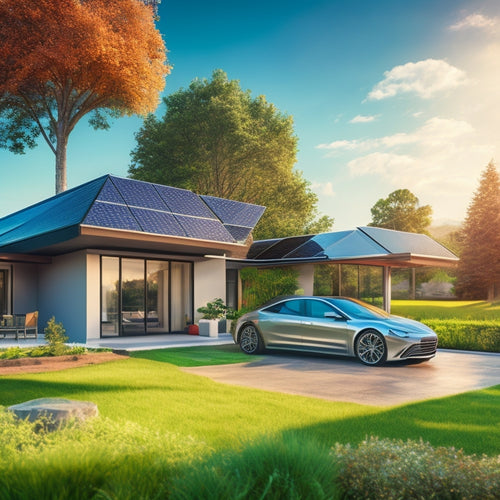
Best Home Solar Panels for This Year
Share
You'll find the top-performing solar panels on the market this year to be dominated by industry leaders like Tesla, SunPower, and Panasonic, which have consistently invested in research and development to deliver exceptional efficiency, durability, and warranties. High-efficiency panels with low temperature coefficients are preferred, and commitment to sustainability and minimizing carbon footprint is a key consideration. By investigating the best value for money options, understanding energy efficiency, and evaluating the right solar panel system for your specific needs, you'll be well on your way to utilizing the power of solar energy - and there's more to uncover as you navigate the world of solar panels.
Key Takeaways
- Top solar panel brands like Tesla, SunPower, and Panasonic offer high-efficiency panels with advanced technology and extensive warranties.
- High-efficiency solar panels with ratings above 20% provide maximum energy production and are ideal for limited roof space.
- Best value for money options like Trina Solar TALLMAX M10 and Jinko Solar Cheetah HC balance quality and affordability.
- Compact solar panels with high power output are designed for small homes, while budget-friendly solutions like community solar programs make solar accessible.
- When selecting the best solar panel, consider factors like energy efficiency, durability, and warranties to ensure a worthwhile investment.
Top Solar Panel Brands
Several top-tier manufacturers dominate the solar panel market, offering high-quality products that cater to diverse consumer needs. You'll find that top rated manufacturers like Tesla, SunPower, and Panasonic lead the way in solar panel technology. These brands invest heavily in research and development, ensuring their products stay at the forefront of innovation.
When selecting a solar panel brand, you'll want to evaluate factors like efficiency, durability, and warranty. Look for manufacturers that offer high-efficiency panels with low temperature coefficients, ensuring peak energy production in various climates.
Additionally, evaluate brands with extensive warranties that cover performance, materials, and workmanship.
Top solar panel brands also prioritize sustainability and environmental responsibility. They adhere to strict quality control measures, minimizing waste and reducing their carbon footprint.
High-Efficiency Solar Panels
When evaluating top solar panel brands, you likely noticed a focus on high-efficiency products. This is because high-efficiency solar panels offer more power per hour of sunlight, making them ideal for homes with limited roof space or high energy demands.
High-efficiency solar panels boast advanced solar panel technology, which enables them to convert sunlight into electricity more effectively. Efficiency ratings, measured as a percentage, indicate how well a panel converts sunlight into electricity. Look for panels with high efficiency ratings (above 20%) for maximum energy production.
Some key benefits of high-efficiency solar panels include:
- Increased energy production per unit area
- Reduced installation costs due to fewer panels needed
- Improved performance in low-light conditions
- Enhanced durability and longer lifetimes
Best Value for Money Options
You're likely looking for solar panels that provide the best value for your money, balancing quality and affordability.
When evaluating options, contemplate a cost comparison of different brands and models. Look for panels with a high power output per dollar spent. This will help you maximize your energy production while staying within your budget.
To get a sense of real-world performance, read customer reviews from homeowners who've installed the panels. Pay attention to feedback on energy output, durability, and maintenance requirements. This will give you a better understanding of how the panels will perform over time.
Some top value options to contemplate include the Trina Solar TALLMAX M10, the Jinko Solar Cheetah HC, and the Canadian Solar MaxPower.
These panels offer high-efficiency ratings, durable construction, and competitive pricing. By assessing the pros and cons of each option, you can find the best fit for your energy needs and budget.
Solar Panels for Small Homes
When you're looking for solar panels for your small home, you'll want to prioritize space-saving panel options that maximize energy production per square foot.
Energy efficiency matters, too, as it directly impacts how much power your system can generate.
You'll also need budget-friendly solutions that fit your unique needs and financial constraints.
Space-Saving Panel Options
Living in a small home doesn't mean you have to sacrifice your dream of going solar. You can still utilize the power of the sun with space-saving panel options designed specifically for compact rooftops.
When shopping for space-saving panels, look for the following features:
-
Compact design: Panels with smaller footprints and higher power outputs, allowing you to generate more energy in less space.
-
Rooftop compatibility: Panels that are designed to fit snugly on smaller rooftops, guaranteeing a secure and efficient installation.
-
High-efficiency cells: Cells that convert sunlight into energy at a higher rate, maximizing your energy output.
- Slim profiles: Panels with slim profiles that reduce wind resistance and allow for easier installation.
These features guarantee that you can generate significant amounts of energy, even with limited rooftop space.
Energy Efficiency Matters
Frequently, homeowners with small homes assume they can't reap the benefits of solar power due to limited rooftop space, but that's not necessarily the case. You can still utilize the power of the sun to reduce your energy bills and carbon footprint.
When it comes to energy efficiency, every little bit counts. By incorporating energy conservation strategies into your daily routine, you can maximize the benefits of solar power. Simple changes, such as switching to energy-efficient appliances and turning off lights when not in use, can make a significant difference.
Investing in solar panels is a great way to tap into renewable energy benefits. Not only do they reduce your reliance on fossil fuels, but they also increase your property value.
With the right solar panel system, you can generate enough clean energy to power your small home, reducing your energy costs and environmental impact. By combining energy-efficient practices with solar power, you can create a sustainable and cost-effective energy solution for your home.
Budget-Friendly Solutions
You don't have to break the bank to employ the power of the sun for your small home.
With the right solutions, you can tap into the energy of the sun without breaking the bank. Budget-friendly solar panels for small homes are now more accessible than ever.
Here are some options to ponder:
-
Community Solar: Join a community solar program, where you can share the benefits of a single solar array with your neighbors, reducing the upfront cost.
-
Financing Options: Investigate financing options like power purchase agreements (PPAs) or solar loans that allow you to pay for your solar panel system over time.
-
Smaller Systems: Opt for smaller solar panel systems that cater specifically to small homes, reducing the overall cost.
- Tier 2 or Tier 3 Panels: Think about using Tier 2 or Tier 3 solar panels, which are more affordable than premium Tier 1 panels without sacrificing too much efficiency.
Panels for Large Homes and Estates
You'll require high-efficiency solar options to satisfy the large capacity energy needs of your spacious home or estate.
These systems can produce more power per hour of sunlight, ensuring you generate enough electricity to support your energy-intensive lifestyle.
High-Efficiency Solar Options
Among the top 5% of solar panels regarding efficiency, high-efficiency solar options are designed to maximize energy production for large homes and estates.
You're likely looking for the most powerful solar panels to meet your energy demands. With recent solar technology advancements, high-efficiency solar panels have become more accessible and affordable.
When comparing panel efficiency, you'll notice that high-efficiency solar options boast higher power output ratings, often above 400 watts. This means you can generate more energy with fewer panels, making them ideal for large homes and estates with limited roof space.
Some key benefits of high-efficiency solar options include:
- Higher energy yields per unit area
- Reduced installation costs due to fewer required panels
- Improved temperature coefficient for better performance in hot climates
- Enhanced durability and longer lifetimes
Large Capacity Energy Needs
Large homes and estates require substantial energy to power their various systems and appliances, making them ideal candidates for high-efficiency solar panels.
You'll need a system that can handle your energy consumption, which is where advanced solar panel technologies come in. To determine the right system size, you'll need to conduct an energy consumption analysis to identify areas of high energy usage.
High-capacity solar panels with high wattage outputs (300-400 watts) are designed to meet the energy demands of large homes and estates.
Look for panels with high efficiency ratings (20-22%) to maximize energy production. You may also consider installing a larger system with multiple strings of panels to increase overall energy output.
When selecting a solar panel system for your large home or estate, consider factors such as roof size, shading, and local building codes.
A professional solar installer can help you design a custom system that meets your specific energy needs and guarantees peak energy production.
Solar Energy Storage Systems
Many homeowners who invest in solar panels soon realize that storing excess energy generated during the day for use at night or during power outages is crucial.
This is where solar energy storage systems come into play. You'll want to contemplate investing in a system that integrates with your solar panel setup to store excess energy in batteries for later use.
When selecting a solar energy storage system, contemplate the following key factors:
-
Depth of discharge: Look for a system that allows for a high depth of discharge, guaranteeing you can use most of the stored energy without damaging the batteries.
-
Cycle life: Choose a system with batteries that can withstand many charge and discharge cycles, reducing replacement costs over time.
-
Compatibility: Verify the system is compatible with your existing solar panel setup and can integrate with energy management systems for peak performance.
- Scalability: Contemplate a system that can be scaled up or down based on your changing energy needs.
Installation and Maintenance Costs
When you invest in a home solar panel system, you'll need to take into account the upfront installation fees, which can vary depending on the complexity of the installation and the type of equipment used.
Additionally, you'll need to factor in ongoing system repairs and maintenance costs to guarantee your system operates at peak efficiency.
Upfront Installation Fees
Your solar panel investment comes with upfront installation fees that encompass not only the cost of the equipment but also the labor and skill required to get your system up and running. These fees can vary depending on the size and complexity of your solar panel system, as well as the installation company you choose.
Some of the key components that contribute to upfront installation fees include:
-
Permitting and inspection fees: These fees cover the costs associated with obtaining necessary permits and passing inspections required by your local government.
-
Mounting and installation hardware: This includes the racking and tracking systems that secure your solar panels to your roof or ground.
-
Electrical infrastructure: This includes the inverters, wiring, and other electrical components necessary to connect your solar panel system to the grid.
- Labor costs: These fees cover the cost of hiring skilled professionals to design, install, and test your solar panel system.
To make your solar panel investment more manageable, many installation companies offer financing options with flexible payment terms.
Additionally, be sure to ask about installation timelines, as these can vary depending on the complexity of the project and the installation company's workload.
Ongoing System Repairs
Beyond the upfront installation fees, you'll need to take into account ongoing system repairs and maintenance costs to guarantee your solar panel system operates at peak performance throughout its lifespan.
These costs can vary depending on the quality of your system and the frequency of maintenance. On average, you can expect to pay between $100 to $300 per year for routine maintenance and repairs.
Regular maintenance is essential to make sure your system runs efficiently. You should inspect your system regularly to identify potential issues before they become major problems.
System troubleshooting can help you identify common issues such as loose connections, dirty panels, or faulty inverters. By catching these issues early, you can prevent more costly repairs down the line.
To minimize maintenance costs, follow these maintenance tips: clean your panels regularly, inspect your system for signs of wear and tear, and keep your system's software up to date.
Warranties and Durability Factors
Warranties and Durability Factors
Reliability is an essential aspect of any home solar panel system, as it directly impacts the return on investment and overall performance. You should carefully assess the warranties and durability factors of different solar panels before making a purchase.
When comparing warranties, you'll want to look at the length of the warranty, what's covered, and the manufacturer's reputation for honoring claims. You should also research the durability testing that manufacturers put their panels through, such as temperature, humidity, and UV exposure tests.
Some key factors to evaluate include:
- The length of the warranty, with 25 years or more being the industry standard
- The type of warranty, with extensive warranties covering more components and repairs
- Durability testing, such as IEC and UL certifications
- The manufacturer's warranty claims process, including response times and customer reviews
Government Incentives and Rebates
Installing solar panels can substantially reduce your energy bills, and government incentives and rebates can further sweeten the deal by offsetting the upfront cost of going solar. As a homeowner, you're eligible for various incentives that can help you save money on your solar panel investment.
Here's a breakdown of some government incentives and rebates you might be eligible for:
| Incentive/Rebate | Description |
|---|---|
| Federal Tax Credits | 26% of total solar panel system cost (residential and commercial) |
| Local Utility Rebates | Varies by utility company, but typically $0.50 to $1.00 per watt |
| State Tax Credits | Varies by state, but typically 10% to 20% of total solar panel system cost |
| Net Metering | Allows you to sell excess energy back to the grid and offset your energy bills |
Keep in mind that these incentives and rebates are subject to change, so it's crucial to research and confirm the specifics before making a purchase. By taking advantage of these government incentives and rebates, you can greatly reduce the upfront cost of going solar and start saving money on your energy bills even sooner.
Key Features to Consider
When evaluating home solar panels, considering key features is vital to confirm you get the right system for your energy needs and budget.
You'll want to assess the solar panel technology, making sure it aligns with your environmental impact goals.
Some important aspects to examine include:
-
Efficiency rating: A higher rating indicates more energy produced per hour of sunlight.
-
Warranty and durability: A longer warranty and durable materials guarantee your system lasts for years to come.
-
Compatibility and integration: Verify the system is compatible with your existing electrical infrastructure and can integrate with monitoring systems.
- Certifications and compliance: Look for certifications like UL and IEC, which confirm the system meets safety and performance standards.
Frequently Asked Questions
Can I Install Solar Panels on a Metal Roof?
You can install solar panels on a metal roof, leveraging its benefits like durability and ease of cleaning. However, consider unique installation requirements, such as specialized clamps and waterproofing, to guarantee a secure and efficient setup.
Do Solar Panels Work During Power Outages?
As you utilize the power of the sun, you'll wonder, do solar panels work during power outages? The answer lies in grid independence, which a solar battery enables, allowing you to tap into stored energy when the grid goes dark.
How Long Does It Take to Install Solar Panels?
You'll spend around 3-5 days overseeing the installation process, but the actual installation time takes only 1-2 days, depending on the complexity of your system and the number of installers on the job.
Can I Add More Panels to My Existing System?
You can definitely add more panels to your existing system, but you'll need to guarantee panel compatibility and consider system expansion limitations, like inverter capacity and available roof space, to maximize your energy output.
Do Solar Panels Work on Cloudy or Rainy Days?
You'll still generate power on cloudy or rainy days, although solar efficiency decreases; on average, you'll produce 10-20% of maximum output in cloudy conditions, but modern panels are designed to maximize energy harvesting even in low-light scenarios.
Related Posts
-

What Solar Panels Work Best With EVS Online?
When shopping for solar panels online to power your electric vehicle, look for high-efficiency models that can withst...
-

What You Need to Know About RV Solar Maintenance
When you're out on the road, your RV's solar panel system is your lifeline. But without regular maintenance, you're l...
-

Step-by-Step Guide to Converting Your Vehicle to EV
You'll begin by evaluating your vehicle's conversion potential, analyzing its weight, aerodynamics, and powertrain co...


